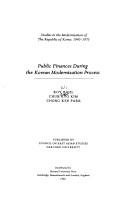| Listing 1 - 10 of 12 | << page >> |
Sort by
|

ISBN: 0803915640 Year: 1981 Publisher: Beverly Hills, Calif. Sage
Abstract | Keywords | Export | Availability | Bookmark
 Loading...
Loading...Choose an application
- Reference Manager
- EndNote
- RefWorks (Direct export to RefWorks)
Book
ISBN: 081316186X Year: 1969 Publisher: Lexington, Kentucky : University of Kentucky Press,
Abstract | Keywords | Export | Availability | Bookmark
 Loading...
Loading...Choose an application
- Reference Manager
- EndNote
- RefWorks (Direct export to RefWorks)
In this study of the structure of core city expenditures, Mr. Bahl analyzes the functional relationship between per capita expenditures and selected economic, demographic, and sociological factors. He finds that the problems central to intercity variations in per capita spending are directly related to the coordination of fiscal and physical planning and that economic and social areas, not corporate boundaries, represent the most appropriate planning units.Mr. Bahl extends the static analysis of the pioneering work of Harvey Brazer to a comparative static and temporal context, comparing throug
Book
ISBN: 0884104230 Year: 1975 Publisher: Cambridge Mass, Ballinger Publishing Company
Abstract | Keywords | Export | Availability | Bookmark
 Loading...
Loading...Choose an application
- Reference Manager
- EndNote
- RefWorks (Direct export to RefWorks)
politique fiscale --- pression fiscale et parafiscale --- depenses nationales --- depenses locales et regionales --- eua --- fiscaal beleid --- fiscale en parafiscale druk --- nationale bestedingen --- lokale en regionale uitgaven --- vsa --- Intergovernmental fiscal relations --- Intergovernmental tax relations --- Municipal finance --- Case studies. --- Finance, Municipal --- Federal-provincial tax relations --- Federal-state tax relations --- State-local tax relations --- Tax relations, Intergovernmental --- Tax sharing --- Federal-state fiscal relations --- Fiscal relations, Intergovernmental --- State-local fiscal relations --- Case studies --- Local finance --- Federal government --- Taxation --- Finance, Public --- Law and legislation

ISBN: 0195208056 Year: 1992 Publisher: Oxford Oxford University Press
Abstract | Keywords | Export | Availability | Bookmark
 Loading...
Loading...Choose an application
- Reference Manager
- EndNote
- RefWorks (Direct export to RefWorks)
Intergovernmental fiscal relations --- Local taxation --- Municipal finance --- User charges --- Charges, User --- Fees, User --- Fees and charges (User charges) --- User fees --- Fees, Administrative --- Finance, Municipal --- Local finance --- Municipal taxation --- Taxation, Local --- Taxation, Municipal --- Taxation --- Federal-state fiscal relations --- Fiscal relations, Intergovernmental --- State-local fiscal relations --- Federal government --- Finance, Public --- Law and legislation --- Public finance --- Taxes --- Developing countries
Book
ISBN: 1282441043 9786612441042 9812818642 9789812818645 9789812818638 9812818634 9781282441040 6612441046 Year: 2009 Publisher: Hackensack, N.J. World Scientific
Abstract | Keywords | Export | Availability | Bookmark
 Loading...
Loading...Choose an application
- Reference Manager
- EndNote
- RefWorks (Direct export to RefWorks)
This book explores the important topic of fiscal decentralization in Asian countries, and focuses on how government finance and administration are being reformed to bring budgetary decisions closer to voters. The focus on Asia is especially important because all countries in this region have been undergoing serious fiscal reforms in the past decade. They include one of the biggest decentralization reforms in Indonesia, significant reforms in democratic Philippines and Vietnam which are in transition, and Japan, whose fiscal reconstruction program is covered extensively.
Decentralization in government --- Centralization in government --- Devolution in government --- Government centralization --- Government decentralization --- Government devolution --- Political science --- Central-local government relations --- Federal government --- Local government --- Public administration --- Asia --- Southeast Asia --- Economic policy.
Book
ISBN: 1558442545 1558442839 9781558442832 9781558442542 Year: 2013 Publisher: Cambridge, Mass. Lincoln Institute of Land Policy
Abstract | Keywords | Export | Availability | Bookmark
 Loading...
Loading...Choose an application
- Reference Manager
- EndNote
- RefWorks (Direct export to RefWorks)
This work uses case studies of urban financing mechanisms in China, India, and Brazil tohelp decision makers in developing countries address the challenges of rapid metropolitangrowth. The report includes policy recommendations and explores the effective useof metropolitan revenue instruments, intergovernmental transfers, public-privatepartnerships, and more.
Municipal finance --- Finance, Public --- Local taxation --- Municipal government --- Cities and towns --- City government --- Municipal administration --- Municipal reform --- Municipalities --- Urban politics --- Municipal taxation --- Taxation, Local --- Taxation, Municipal --- Cameralistics --- Public finance --- Finance, Municipal --- Government --- Local government --- Metropolitan government --- Municipal corporations --- Local finance --- Taxation --- Currency question --- E-books --- Public finances --- Developing countries
Book
Year: 2006 Publisher: [Washington, D.C. : World Bank,
Abstract | Keywords | Export | Availability | Bookmark
 Loading...
Loading...Choose an application
- Reference Manager
- EndNote
- RefWorks (Direct export to RefWorks)
"While there is extensive knowledge about how to design fiscal decentralization policies, considerably less is understood about how a decentralization program should be sequenced and implemented. Countries embarking on decentralization often struggle with decisions about the essential components of decentralization, including the order of an introduction of decentralization policies, the number of years necessary to bring a full program on line, and the components of the transition strategy. The authors argue that the sequencing of decentralization policies is an important determinant of its success. The consequences of a poorly sequenced decentralization program can range from minor delays and complications to ineffectiveness and subsequent failing support of decentralization efforts, macroeconomic instability, and fundamental failure in public sector delivery. At a minimum, the strategy of "making it up as we go" will not lead to the same structure of decentralization as will a planned strategy. The paper raises two questions: First, is there an optimal sequencing for decentralization policies and implementation? The answer is that there is, and that following these sequencing rules can reduce the costs and risks of implementing fiscal decentralization. Second, to what extent do countries follow these optimal sequencing rules? The answer is, in general, they do not. The gap between theory and practice is a result of the complexity of sequencing design, which discourages fiscal planners from implementing the full process. In addition, sequencing requires a sustained discipline and vision for its implementation, as well as overcoming pressures from political actors, especially in developing countries. "--World Bank web site.
Book
ISBN: 9781684172412 9780674722330 Year: 1986 Publisher: Boston : Leiden; Boston : Harvard University Asia Center BRILL
Abstract | Keywords | Export | Availability | Bookmark
 Loading...
Loading...Choose an application
- Reference Manager
- EndNote
- RefWorks (Direct export to RefWorks)
Book
Year: 2006 Publisher: [Washington, D.C. : World Bank,
Abstract | Keywords | Export | Availability | Bookmark
 Loading...
Loading...Choose an application
- Reference Manager
- EndNote
- RefWorks (Direct export to RefWorks)
"While there is extensive knowledge about how to design fiscal decentralization policies, considerably less is understood about how a decentralization program should be sequenced and implemented. Countries embarking on decentralization often struggle with decisions about the essential components of decentralization, including the order of an introduction of decentralization policies, the number of years necessary to bring a full program on line, and the components of the transition strategy. The authors argue that the sequencing of decentralization policies is an important determinant of its success. The consequences of a poorly sequenced decentralization program can range from minor delays and complications to ineffectiveness and subsequent failing support of decentralization efforts, macroeconomic instability, and fundamental failure in public sector delivery. At a minimum, the strategy of "making it up as we go" will not lead to the same structure of decentralization as will a planned strategy. The paper raises two questions: First, is there an optimal sequencing for decentralization policies and implementation? The answer is that there is, and that following these sequencing rules can reduce the costs and risks of implementing fiscal decentralization. Second, to what extent do countries follow these optimal sequencing rules? The answer is, in general, they do not. The gap between theory and practice is a result of the complexity of sequencing design, which discourages fiscal planners from implementing the full process. In addition, sequencing requires a sustained discipline and vision for its implementation, as well as overcoming pressures from political actors, especially in developing countries. "--World Bank web site.

ISBN: 1684172411 0674722337 Year: 1986 Publisher: Boston : Leiden; Boston : Harvard University Asia Center, BRILL,
Abstract | Keywords | Export | Availability | Bookmark
 Loading...
Loading...Choose an application
- Reference Manager
- EndNote
- RefWorks (Direct export to RefWorks)
| Listing 1 - 10 of 12 | << page >> |
Sort by
|

 Search
Search Feedback
Feedback About UniCat
About UniCat  Help
Help News
News